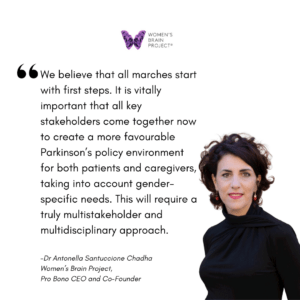Parkinson’s Disease (PD) is more prevalent among males than females; globally, 4.6m males
are living with Parkinson’s as compared to 3.8m females.i
Although males are more likely to be diagnosed with Parkinson’s, females appear to have
more negative effects and less of a response to existing medicines.ii
Research shows that caregiver burden is high among Parkinson’s caregivers (the vast
majority being women), who likely face emotional, social, physical, and financial challenges
as a result.iii
Bottighofen, Switzerland, 29th November 2023 – on the occasion of World Movement Disorders Day, #MoveDisorder, and during the globally recognised Care Partner Awareness month, the Women’s Brain Project (WBP) held the WBP roundtable on enhancing care in Parkinson’s Disease (PD), supported by sponsorship from AbbVie.
This first roundtable, held on 29th November 2023, brought together key stakeholders to discuss how we can ensure better outcomes in Parkinson’s care by addressing vital policy changes. The intention was to determine the need for action to enhance care in PD and find policy solutions at global, EU and national levels. Central to this is the importance of lived experience, both of the patient and the caregiver, as well as the gender perspective. The first roundtable validated the policy initiatives that need greater attention and focus. A summary note with key recommendations for action will now be developed, paving the way for potential collaboration opportunities for all stakeholders in the form of new impactful policy-led activities into 2024 and beyond.
The roundtable event, held under the Chatham House Rule, brought together people with lived experience, global and European policy-led stakeholders, PD experts and clinicians. The roundtable marks the first step of an initiative to raise awareness and propose tangible policy solutions to tackle the challenges facing both people living with Parkinson’s and caregivers, to enhance their quality of life.
This multistakeholder initiative, involves international governmental organisations, as well as PD associations, caregiving associations, neurological associations, think tanks and leading experts at global, European and national levels, and most importantly people with lived experience. In light of the roundtable, WBP will explore the best way forward. This initiative could be carried out through a number of roundtables, resulting in the formulation of ‘policy asks’, which will be potentially developed into a White Paper / Call to Action for launch during the course of 2024.

“As highlighted in the WBP-commissioned Economist Impact White Paper, Sex, gender and the brain: Towards an inclusive research agenda, although males are more likely to be diagnosed with Parkinson’s, females appear to have more negative effects and worse reactions to existing medicines. We also know that the PD caregiving burden is very high among women. We believe that all marches start with first steps. It is vitally important that all key stakeholders come together now to create a more favourable Parkinson’s policy environment for both patients and caregivers, taking into account gender-specific needs. This will require a truly multistakeholder and multidisciplinary approach.” said Dr Antonella Santuccione Chadha, Co-founder and pro bono CEO of WBP.
“At AbbVie, we understand the realities and challenges that people living with Parkinson’s disease and movement disorders face,” said Dr Maurizio Facheris, Global Development Lead, Neuroscience Development, AbbVie. “This partnership with the Women’s Brain Project reinforces our commitment to advance the standard of care for people living with these neurological disorders, their care partners and their loved ones.”
We thank everyone who participated in the roundtable today for their invaluable contributions. Together we are making a genuine difference to advance care in Parkinson’s.
*******************
About the Women’s Brain Project:
WBP is an international organisation studying sex and gender determinants of brain and mental health to achieve precision medicine and care. WBP is a global leading player in the field of brain research, supporting innovative science, precision medicine and care, unbiased AI and promoting gender health equity to make healthcare systems more sustainable. WBP is in the process of establishing a Foundation, which will operate the Research Institute for Sex and Gender Precision Medicine. For more information, please visit: https://www.womensbrainproject.com
About AbbVie:
For more information, please visit: https://www.abbvie.com
Endnotes
- i Economist Impact: Sex, gender and the brain: Towards an inclusive research agenda, 2023 (WBP-commissioned work), https://www.womensbrainproject.com/ei-white-paper
- i Economist Impact: Sex, gender and the brain: Towards an inclusive research agenda, 2023 (WBP-commissioned work), https://www.womensbrainproject.com/ei-white-paper/
- iii Parkinson’s Carers Survey Report, published in 2020, research carried out in 2019, Parkinson’s Europe
(formerly European Parkinson’s Disease Association) https://www.parkinsonseurope.org/media/2809/epda-parkinson-s-carers-survey-report.pdf



